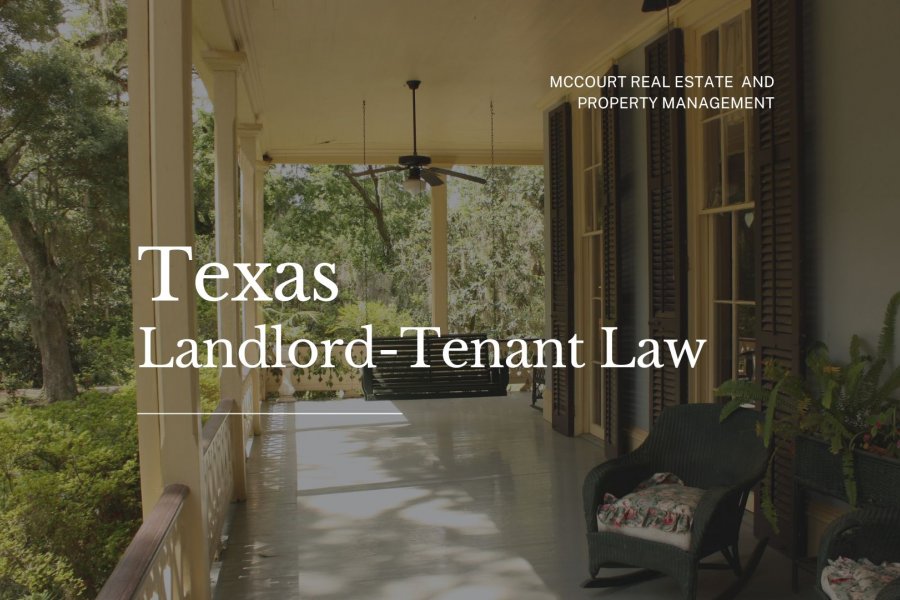
All US states, including Texas, have landlord-tenant laws in place. It can be difficult for landlords, especially those who are new to the business or unfamiliar with local legislation or federal laws, to navigate these legal waters alone.
Our comprehensive guide to Texas landlord-tenant law can help you understand your rights and responsibilities as a landlord.
Texas Tenant Rights and Responsibilities
According to the state's landlord-tenant law, a tenant's rights include:
- A clean, safe, and habitable environment and withhold rent if this is not fulfilled by the landlord
- Be treated fairly by their landlord without discrimination, either based on race, color, sex, religion, or disability, as stated in Texas' Fair Housing laws.
- Enjoy a quiet enjoyment of their rental unit.
- A secure home with solid locks and other security measures or security devices properly installed by the landlord.
- Unless there is a breach of the lease, the right to remain in the unit.
On top of tenant rights, Texas tenants have the responsibilities to:
- Pay rent on the proper date each month.
- Maintain a safe and habitable condition within the rental home, including protecting the tenant's physical health.
- Only use fixtures and appliances for their intended use, maintaining them in a sanitary condition.
- Make small repairs when necessary.
- Inform their landlord immediately if they notice an issue or defect in the rental home.
- Respect and accept other tenants and neighbors.
- Follow any rules, policies or regulations that are in the lease and those mandated by local, state and federal laws.
- Allow landlord entry under emergency or otherwise special circumstances.
If a tenant fails to fulfill their responsibilities, a landlord can move to evict them even if the tenant pays rent properly.

Texas Landlord Rights and Responsibilities
According to Texas landlord-tenant law, Texas landlords have the right to:
- Collect rent on the agreed-upon monthly date and charge late fees for late rent payment.
- Refuse cash rent payments only if another rent payment method is specificied in the written lease agreement.
- Deduct the costs of repairs beyond normal wear and tear from the tenant's security deposit.
- Be given a minimum of one month's written notice before the tenant vacates the premises.
- Terminating the lease early if the tenant breaks the lease agreement or evicting the tenant when legally applicable.
As per Texas landlord-tenant laws, landlords have the responsibility to:
- Maintain safe and habitable living conditions for their tenants throughout the duration of the lease agreement as per Texas property code, including bona fide repairs.
- Accept complaints and respond to maintenance requests, including for security devices, within three to seven days, depending on the issue.
- Maintain compliance with local, state, and federal laws, such as Fair Housing laws.
- Provide information to tenants about any necessary disclosures like lead paint or charging late fees.
An Overview of Texas Landlord-Tenant Laws
Condition, Maintenance, and Repairs
Texas landlords are required by Texas landlord-tenant laws to provide safe and habitable living conditions for the rental property as per Texas property code. They must respond to any necessary repairs that involve a lack of drinking water, heat, or air conditioning within three days, unless the written lease or rental agreement states otherwise. Other maintenance issues must be responded to within seven days from the date the tenant gave notice.

Texas law does not specify the amenities or services that must be provided by the landlord. Instead, the law has an open-ended warranty of habitability, and Texas landlords are only required to make repairs to amenities that are already on the rental property and that “materially affect the physical health and safety of an ordinary tenant”.
There is only one exception – smoke detectors and hot water. These must be functioning and available to the tenants on the premises at all times. If a landlord fails to provide this, there may be legal consequences.
Texas Housing Discrimination Laws
Texas fair housing laws strictly prohibit discrimination from a landlord based on race, color, nationality, religion, familial status, sex, or disability and tenants should be considered as long as they fit requirements like being able to pay rent. Owner-occupied homes and rental homes run by religious groups are exempt from these rules.
In Texas, the Department of Housing and Community Affairs is in charge of handling all matters related to housing discrimination. Each entry below is an example of potentially discriminatory behavior when in relation to a member of a protected group:
- Lying about the availability of a rental home.
- Different lease or rental agreement requirements.
- Any advertising that may indicate a discriminatory preference for tenant.
- Denying reasonable accommodations.
- Persuading tenants to rent in areas or buildings that may be perceived as segregated.
The penalty for a landlord accused of housing discrimination varies depending on the case.

Security Deposits
Texas does not state a limit to how much a landlord can require a tenant to pay for a security deposit, such as one month's rent. The time limit for when a landlord must account for the security deposit or return the deposit to the tenant is 30 days after the resident has moved out and any non-damage repairs must be dealt with at the landlord's expense.
If the security deposit is wrongfully withheld from the tenant, a landlord may be subject to paying the tenant in question up to 3 times the amount of the security deposit, in addition to having to pay for legal counsel fees.
Landlord Disclosures
According to the state law, there are a few things that every landlord must disclose to tenants prior to having them sign the lease agreement. This includes the following:
- Lead-Based Paint: If the rental home was built prior to 1978, the landlord must provide the tenant with information on concentrations of lead paint on the premises.
- Authorized Agents: Texas landlords are legally required to provide tenants with a list of the names and addresses of anyone who will be involved in the management of the property.
- Parking Regulations: Texas landlords who own multi-family complexes must provide tenants with the property's parking rules or regulations.
- Emergency Phone Number: Texas landlords must provide tenants with a 24-hour emergency phone contact to call if there are any issues on the property that need immediate attention.

Small Claims Lawsuits in Texas
In Texas, the small claims court will hear rent-related cases that are valued up to a maximum of $10,000. This typically involves cases about security deposits or missing rent payments. There is a four year statute of limitations for residential lease contracts. Violations of Fair Housing are not small claims and are handled by the state justice court.
Bottom Line
Understanding the laws that govern landlord-tenant relationships is key to being a successful landlord. We hope this overview of Texas landlord-tenant laws has helped with and questions you may have had. If you need any further help, don’t hesitate to contact us at McCourt Real Estate and Management.
Disclaimer: Please do not use this blog post as a substitute for legal counsel or advice from a licensed attorney in Texas. Laws change frequently, and this post may not be updated at the time that you read it. Please contact us if you have any questions about Texas laws or anything else regarding your property management needs.